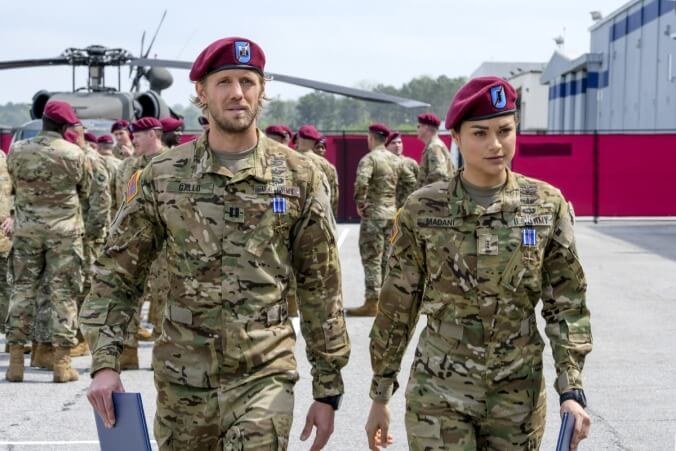Valor has no interest in subtlety, sir

A helicopter glides through the air, its movements smooth, graceful, and unhurried. Inside, the pilots joke and banter, trade jibes with their passengers, and prepare to land. It’s relaxed, but focused; intense, but not needlessly so. As things go wrong, the jocularity evaporates, but the focus does not. The only way anyone on board will survive is by doing what needs to be done. There’s no time for anything but direct action.
In those moments, Valor presents itself as a promising, if familiar, kind of story. It’s a workplace drama in which the workplace is liable to be fired upon by enemy combatants at any moment, and it feels every bit as capably handled as that helicopter. If Kyle Jarrow’s new series, one of several military dramas arriving this fall, had found a way to maintain that focused but relaxed energy, we might be looking at a different series. Alas, it wasn’t meant to be. Much like Warrant Officer Nora Madani, Valor doesn’t seem to know when to ease up on the throttle.
Madani (Christine Ochoa), one of the pilots at the controls in that opening scene, is among the first female pilots in Special Operations Aviation. Valor’s first episode sees Madani struggling with a mission gone wrong—a wound that still aches, a dependency on pain medication, jarring flashbacks, and anxiety—but what really weighs on her is a secret. We know this, because Valor can’t stop pointing it out. “That decision we made was a mistake,” Madani tells her copilot and commanding officer, Captain Leland Gallo (Matt Barr). “Ever since, it’s all I can think about.”
It’s one of any number of ways that Valor displays its disinterest in subtext—not the gravest of sins, but also not a great one for an hour-long drama to commit so regularly. Throughout the hour, nearly everyone says exactly what they think and want without any hesitation. In a way, it’s almost refreshing, or would be, if it didn’t rob nearly every scene of its potency. There are few fraught glances and even fewer loaded silences, and instead we get dialogue as nimble as a big wooden mallet: “I need answers.” “I’ve told so many lies.” “This is bad.” “That’s not good.” “That’s messed up.” “I thought I was stronger than this.”
It’s too bad, because when Jarrow and company make time for nuance, some interesting things happen. The events of the crash, seen in scattered flashbacks, might layer in some intrigue if the show weren’t constantly spelling everything out for its audience, and that particular thread gets a boost when a CIA officer known only as Thea (Melissa Roxburgh) arrives to help sort things out. Roxburgh isn’t exactly aided by the dialogue, either— “Has anyone ever told you you look like an action figure?” she says, by way of greeting, to the intelligence officer with whom she’ll be collaborating (Charlie Barnett as Ian Porter)—but her arrival shifts the energy of the pilot, with each interaction playing like the earliest moves in a game of cat and mouse. It’s not terribly original stuff, but it makes for decent viewing. Unfortunately, the most original aspect of this story is the one which seems least likely to get some breathing room.
Perhaps a military drama about a high-ranking, extremely skilled, and somewhat troubled female pilot would be a hard sell. That’s not difficult to imagine. It’s possible that Valor could only exist when packaged with a love triangle and a conspiracy or two. It’s a shame, because even with the on-the-nose dialogue, Ochoa’s performance brings Madani to almost vibrant life. Like the dialogue, her work isn’t particularly subtle, but in Ochoa’s hands, that matters less. Madani isn’t a subtle woman.
There’s no moment of intrigue or messy romantic entanglement that’s anywhere near as interesting as watching this Madani make her way in a man’s world, quietly demanding she be treated like everyone else without ever forgetting the stakes. It’s easy to forget the broad statements of intention when an easy grin spreads across her face at the sight of the helicopter she’s about to fly (“Adele is ready to roll in the deep”). Ochoa even makes Madani’s only means of blowing off steam—wailing on a drum kit—seem not only believable, but genuinely engaging. If it sounds a little ridiculous, it is, and yet Ochoa pulls it off. This is a character worth watching, and a story worth telling. Whether Valor is up to the task remains to be seen.
“Duty is the cure for weakness,” Madani tells Capt. Gallo, and while it’s another example of Valor telling us what it might otherwise reveal organically, it’s an intriguing enough insight into this woman’s life. Such a moment stands out, because if Valor lacks one thing—and it lacks plenty of things—it’s insight. To tell a familiar story is no crime; to do it in a lackluster way isn’t either. To create a compelling character and then not dig any deeper—that’s another story. But there’s no time for that thoughtful stuff. Valor’s got a job to do.